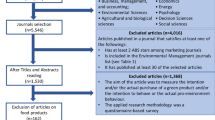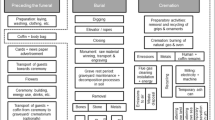Abstract
Purpose
This study aims to investigate the social implications of palm oil biodiesel via a case study using a life cycle assessment framework.
Methods
The case study was conducted in Jambi Province of Indonesia and involved several stakeholders, such as value chain actors, employees, local community members, government, and nongovernmental organization representatives related in palm oil industry. The assessment was carried out using social criteria developed by adopting the Society of Environmental Toxicology and Chemistry/United Nations Environment Programme Code of Practice, supplemented by an expert survey, and supported by literature review. Stakeholders’ perspectives were evaluated by determining the gaps between expected and perceived quality of each social criterion, which are gauged using seven-point Likert scale.
Results and discussion
Twenty-four social criteria were developed and aggregated into five social impact categories: human rights, working condition, cultural heritage, social–economic repercussion, and governance. These criteria have been weighted, useful for further application in multicriteria decision analysis. The results of the stakeholders’ survey reveal the critical social hotspots, which are the issues within the impact categories of working conditions and cultural heritage.
Conclusions
In order to achieve the social equitability of palm oil biodiesel, which is an important pillar to sustainability, efforts must be put to address these social hotspots through actions in various policy level.


Similar content being viewed by others
References
Benoit C, Norris GA, Vladivia S, Ciroth A, Moberg A, Bos U, Prakash S, Ugaya C, Beck T (2010) The guidelines for social life cycle assessment of products: just in time! Int J Life Cycle Assess 15:156–163
Benoit-Norris C, Cavan DA, Norris G (2012) Identifying social impacts in product supply chains: overview and application of the social hotspot database. Sustainability 4:1946–1965
Buchholz T, Luzadis VA, Volk TA (2009) Sustainability criteria for bioenergy system: result from an expert survey. J Cleaner Prod 17:S86–S98
Colhester M, Jiwan N, Andiko Sirait M, Firdaus AY, Surambo A, Pane H (2007) Promised land: palm oil and land acquisition in Indonesia implications for local communities and indigenous people (rev. ed.). SawitWatch, Bogor, 197 pp
Cramer J (ed) (2007) Testing framework for sustainable biomass: final report from the project group “Sustainable production of biomass”. Energy Transition’s Interdepartmental Programme Management (IPM), The Netherlands, 72 pp
Friends of the Earth, LifeMosaic, and SawitWatch (2008) Losing ground: the human rights impacts of oil palm plantation expansion in Indonesia. SawitWatch, Bogor, 108 pp
Halog A, Manik Y (2011) Advancing integrated system modeling framework for life cycle sustainability assessment. Sustainability 3:469–499
Heijungs R, Huppes G, Guineé JB (2010) Life cycle assessment and sustainability analysis of products, materials and technologies: toward scientific framework for sustainability life cycle analysis. Polym Degrad Stabil 95:422–428
Labuschagne C, Brent AC (2006) Social indicators for sustainable projects and technology life cycle management in the process industry. Int J Life Cycle Assess 11:3–15
Manik Y, Halog A (2013) A meta analytic review of life cycle assessment and flow analyses studies of palm oil biodiesel. Integr Environ Assess Manag 9:134–141
Margono BA, Turubanova S, Zhuravleva I, Potapov P, Tyukavina A, Baccini A, Goetz S, Hansen M (2012) Mapping and monitoring deforestation and forest degradation in Sumatra (Indonesia) using Landsat time series data sets from 1990 to 2010. Environ Res Lett 7:034010, 16 pp
Roundtable Sustainable Palm Oil (2007) RSPO principles and criteria for sustainable palm oil production including indicators and guidance. 53 pp. Available online at: http://www.rspo.org/files/resource_centre/RSPO%20Principles%20&%20Criteria%20Document.pdf
United Nations (2008) United Nations Declaration on the Rights of Indigenous Peoples (A/RES/61/295). 15 pp. Available online at: http://www.un.org/esa/socdev/unpfii/documents/DRIPS_en.pdf
United Nations Environment Programme–Society of Environmental Toxicology and Chemistry (2009) Guidelines for Social Life Cycle Assessment of Products, Paris, France: UNEP-SETAC Life-Cycle Initiative. 103pp. Available online at: http://lcinitiative.unep.fr/
United Nations Environment Programme–Society of Environmental Toxicology and Chemistry (2011) Towards a Life Cycle Sustainability Assessment. Making informed choices on products. Paris, France: UNEP/SETAC Life Cycle Initiative, Paris. Available online at: http://lcinitiative.unep.fr/
Weidema B (2006) The integration of economic and social aspects in life cycle impact assessment. Int J Life Cycle Assess 11(SI):89–96
Acknowledgments
The authors would like to thank the SawitWatch, the Wahana Lingkungan Hidup Indonesia (WALHI), Aliansi Masyarakat Adat Nusantara (AMAN), the Komunitas Konservasi Indonesia (KKI-WARSI), the Perhimpunan Pelestari Burung dan Habitatnya (Burung Indonesia), the Restorasi Ekosistem Indonesia (REKI), and the World Agroforestry Center (ICRAF) for their assistance during the field research. This study was sponsored by the Fulbright Program administered by the American Indonesian Exchange Foundation (AMINEF)
Author information
Authors and Affiliations
Corresponding author
Additional information
Responsible editor: Andreas Jørgensen
Electronic supplementary material
Below is the link to the electronic supplementary material.
ESM 1
DOCX 25 kb
Rights and permissions
About this article
Cite this article
Manik, Y., Leahy, J. & Halog, A. Social life cycle assessment of palm oil biodiesel: a case study in Jambi Province of Indonesia. Int J Life Cycle Assess 18, 1386–1392 (2013). https://doi.org/10.1007/s11367-013-0581-5
Received:
Accepted:
Published:
Issue Date:
DOI: https://doi.org/10.1007/s11367-013-0581-5




